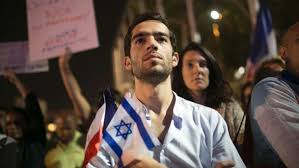A trip to France reveals how its citizens are learning to live in the shadow of terrorism.
“So, you’re probably not coming…” my daughter said with a mixture of fear and resignation.
We were on the phone, I in Jerusalem, she in Paris, the day after the massive terrorist attacks in the heart of the City of Light. My French grandson’s greatly anticipated bar mitzvah was only three weeks away. For the first time in years, the entire family in Jerusalem—my other three children and six of seven grandchildren—had tickets to join their sister, aunt and cousins in France.
“Of course we’re still coming,” I answered emphatically. I was, in fact, terrified.
Having lived through a terrorist attack at the Park Hotel in Netanya on seder night in 2002 with my husband and children, I wasn’t naive enough to think, as I had back then: What are the chances they’ll davka pick our hotel? Whatever the odds, when it happens to you, it’s 100 percent.
But how ludicrous would it be for me, living in Jerusalem, a city with almost daily incidents involving knife- and car-wielding jihadi murderers, to tell my daughter it’s not safe enough in Paris for us to come? My kids were apparently of the same mind. This was true even after news sources reported that Arabic graffiti had been found close to the engines on easyJet planes in Paris airports. We were all traveling with easyJet.
My children, I reminded myself, are Israelis. In Israel, you learn not to change your plans because of terrorism. You take whatever precautions you can and then accept that whatever is going to happen is going to happen.
The flight was uneventful, even boring. My French son-in-law met us and managed to fit nine people and all our luggage into his van. “That’s the Stade de France,” he pointed out on the way, calling our attention to the stadium targeted by terrorists. It was enormous. I tried not to imagine what could have happened had security guards not stopped the suicide bombers from getting inside. It could have easily been another 9/11.
My son-in-law, French by birth, was pretty happy with the steps taken by President François Hollande since the attacks. He felt confident the worst was behind them.
I didn’t share his optimism. “Will there be guards at the bar mitzvah?” I asked.
By government decree, he explained, all Jewish institutions in France were now guarded by the army during opening hours.
On Shabbat, I saw the reality: The entrance to the synagogue was completely barred by plastic crowd-control barriers guarded by four uniformed, machine-gun-toting soldiers who inspected everyone attempting to enter the code-locked side door. Inside, three additional soldiers sat at a long table with their weapons and communications equipment. They too checked us over as we walked in.
It was jarring. Despite Jerusalem’s terrorism problem, I almost never see armed soldiers, certainly not at the entrance to my synagogue. But my French family was grateful. “If only the Jewish school in Toulouse had been guarded,” my daughter pointed out. She had been a teacher there doing her National Service and had known the rabbi and his family well. When the rabbi’s daughter Miriam was murdered at the school’s entrance by a jihadi Muslim anti-Semite in 2012, along with one of my daughter’s former students and his children, there was no guard on duty to protect them.
The bar mitzvah took place near my daughter’s home in a quiet suburb of Paris, a place that is the face of France’s vaunted multiculturalism. Its small Jewish community lives side by side with traditionally dressed Muslims, Africans and other immigrants. There is a halal butcher shop and a mosque, a Portuguese restaurant and a small kosher sandwich shop. The Jewish community is far outnumbered by Muslims. Yet the town’s mayor has gone out of her way to make Jewish residents feel cherished and comfortable. The town provides not only security but also a building for a yeshiva, which my son-in-law runs.
After the bar mitzvah service, my grandsons wore their kippot openly in the streets, and no one gave them a second glance. Still, I wondered if we would be in any danger when a whole crowd of kippa-wearing Jews exited the synagogue to eat a festive lunch in the nearby yeshiva. My fears were put to rest as I learned that—despite his proclaimed ease—my son-in-law had arranged for the soldiers to follow us and guard the yeshiva while we ate.
As my grandson—tall and handsome—stood at the bimah of the beautiful Sephardic synagogue reading his Torah portion with ease, surrounded by French Jews whose ancestors had fled oppression in Arab lands such as Tunisia, Algeria and Morocco, I couldn’t help wondering what kind of future awaited him and this wonderful community if their lives as traditional Jews were possible only under heavily armed guard.
The rest of my time in France broadened that question. It was not only Jews who were under siege. I was astonished to find how many of the precautions we take for granted in Israel—like opening your handbag for examination before entering a supermarket or shopping mall —are now part of life in the French capital. Although the French have been among Israel’s harshest critics, I felt surprisingly sad for them and for myself. There is no place left where you can take a vacation from constant vigilance and ever-present worry about terrorism.
As I looked around at French people doing their holiday shopping in their stylish stores beneath their gorgeous Christmas decorations, I imagined I saw the same determination I see in Israelis to keep living a normal life, not to give in, not to give up. But beneath the sparkle, their faces showed the strain of this new reality, and I felt their confusion and pain, the shattering of the comforting illusion that they would not be targeted because they didn’t deserve it. It was a sad but necessary awakening, as I myself learned only too well.
This article was originally published in the January-February 2016 issue of Moment Magazine.

